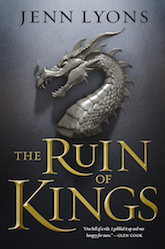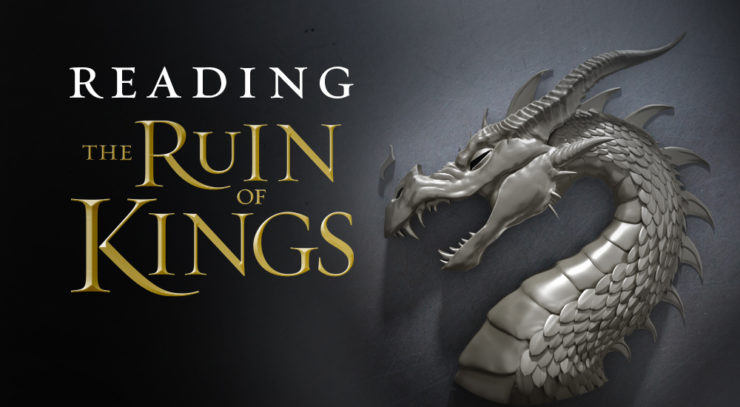‘Allo, chaps and chappettes! This here’s another Reading ROK, innit? Right then!
This blog series will be covering the first 17 chapters of the forthcoming novel The Ruin of Kings, first of a five-book series by Jenn Lyons. Previous entries can be found here in the series index.
Today’s post will be covering Chapter 5, “Leaving Kishna-Farriga”, which is available for your reading delectation right here.
Read it? Great! Then click on to find out what I thought!
They’re on a boat! After a lovely crawl through the sewers! Not Kihrin’s favorite boat, understandably, it being the one that brought him to be sold into slavery in the first place, but it’s good that we are (literally) going somewhere.
Meanwhile his travel companions/owners continue to be creepy:
I fought the urge to ask if [Khaemezra] kept a cottage in the darkest woods, and if she preferred rib or thigh meat on her roasted children. If she’d told me she was Cherthog’s hag wife Suless, goddess of treachery and winter, I’d have believed her without question.
It’s not clear yet whether RoK’s cultural references are deliberate shoutouts to anything in particular or not, but this definitely rang a bell for me, because I’ve read a loooot of fantasy mythology cannibalized from real world myths, and Googling “Eastern European deities” led me to the Slavic god Chernobog (or Czernobog, or any of a dozen different spellings), who has been riffed upon from everyone from Neil Gaiman to Disney (also possibly Tolkien, as an inspiration for the balrog, though I don’t know that such an allusion was ever acknowledged by the author. Tolkienites, educate us!)
By interesting contrast, the only goddess I found in my (admittedly fairly cursory) research with a name similar to “Suless” was the Celtic goddess Sulis, who is actually associated with sunlight and justice, which seems exactly backwards to the entity mentioned here, sooo in conclusion maybe it was just made up and I dunno.
(The thing about a child-eating witch who lives in the woods, though… well, we all know that one.)
Speaking of goddesses, though, in this chapter we learn that Kihrin worships (or worshipped, anyway) Taja, the goddess of “random, fickle, cruel chance”. Which… only makes sense, really, for a thief. What else is getting mugged or burgled but random cruel chance?
(Also, I could swear the name “Taja” is also a reference to something, possibly even an actual game of chance, but Google has failed to provide, and I think I might be remembering another made-up fantasy game of chance anyway, so nevermind. Unless someone in the audience has an idea?)
More sort of confusing references to Kihrin’s backstory emerge in his thoughts re: being back on the ship with Captain Juval, the guy who apparently kidnapped him into slavery and gaeshed his soul while he was at it, for reasons Kihrin is still being cagy about. For one thing, it seems an astounding coincidence that the star tear necklace the Black Brotherhood used to buy Kihrin (and Kihrin promptly stole) is the same necklace which, well, I’ll let Kihrin tell it:
Crown jewels from the treasury of the mightiest Empire in the whole world, stolen from the hoard of a dragon, gifted to a goddess, and lastly, used a payment to a whore in what must surely have been the most expensive night of earthly pleasure ever purchased.
The same whore turned madam who’d raised me.
If Taja is the goddess of chance she surely had her finger on that coinkydink, sez me. But really, it’s almost certainly not a coincidence at all.
Buy the Book


The Ruin of Kings
Also, Kihrin refers to the Stone of Shackles as his “second-most valuable possession” but also considers it worth more than the star tear necklace, which promptly begs the question of what could possibly his most valuable possession, if neither of those things are it? Hmm.
As an aside, the idea that the captain of a slaver ship named it “The Misery” shows a disturbing amount of self-awareness for someone doing something that so obviously calls for a determined un-awareness of other people’s suffering. But then, apparently a lot of otherwise good people are perfectly okay with slavery aka human suffering if it’s baked into the fabric of their culture, so… yay? (Yeah, definitely not yay. Ugh.)
And oh ho! Kihrin knows dear old Thurvy, our resident chronicler and snarky footnoter! And also considers him responsible for his current situation (which of course Thurvishar denies in footnote form, though not very convincingly), which is veddy interestink.
It’s all veddy interestink! And probably literally stink, since I can’t imagine a slave ship is anything I want to smell (or see, or have exist) ever. Anyway, tune in next week to find out where they’re going and whether it’s better than where they’ve been! (Odds are: no.) Cheers!










